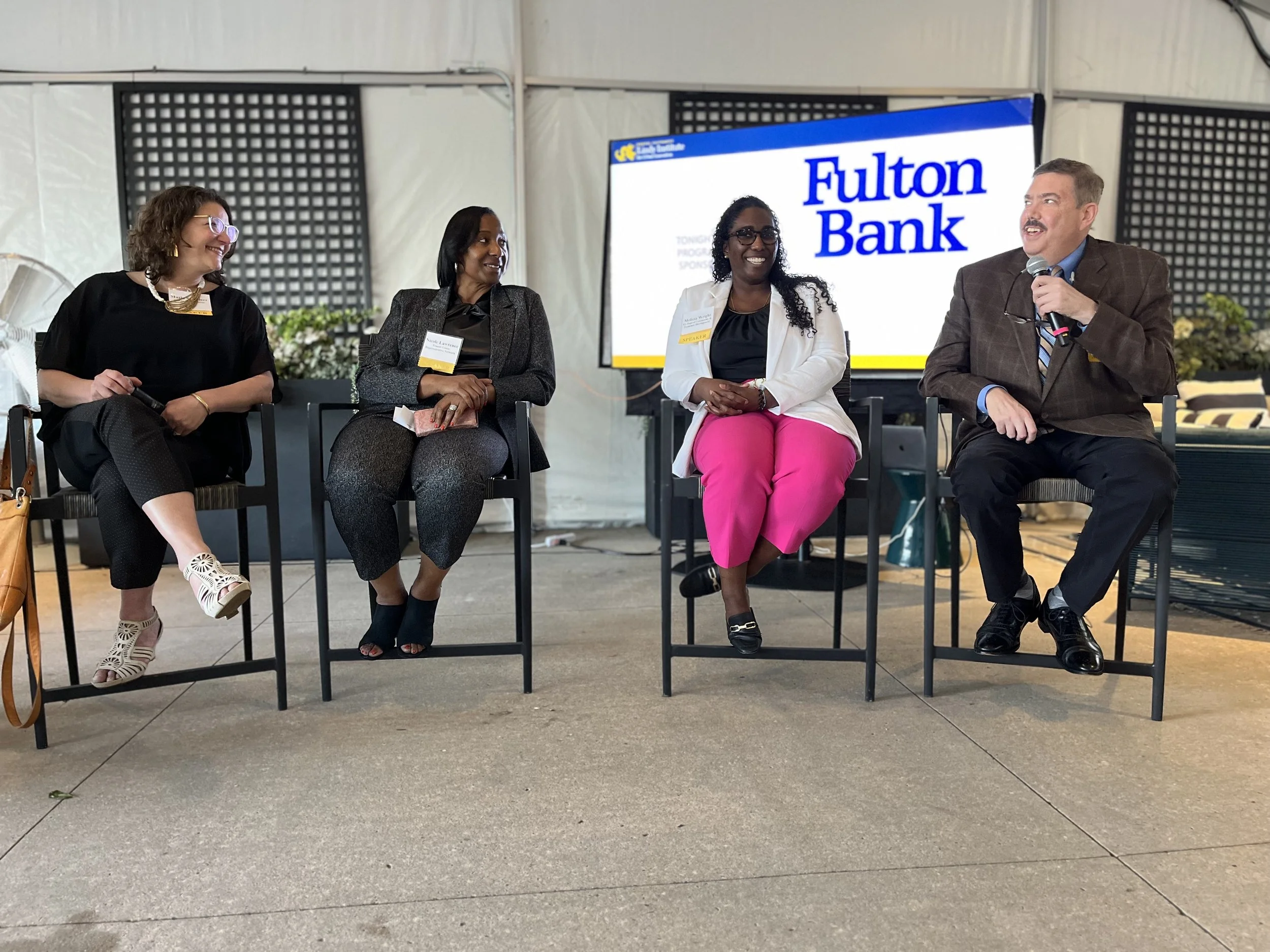When it comes to the housing market, Philly can’t quite reach the ‘Goldilocks Zone’
Panelists (left to right) Maria Sourbeer, Nicole Lawrence and Melissa Wright enjoy a comment by Kevin Gillen.
By Chris Satullo
The Philadelphia housing market has strengths, but they will be fully tested by the coming economic climate, a panel of housing experts told the Sunday Breakfast Club at the final event of its season last Wednesday at the Mann Center.
The program, wrapping up the season's focus on It's a Big Deal, was billed as "Gimme Shelter: Housing Affordability in the Philly Region." The program sponsor was Fulton Bank.
The panelists brought varying expertise and views to topics such as affordability, tariffs, tenant rights, regulation, and gentrification.
Affordability
For people looking to buy a first home or a "move up" home, the region isn't nirvana, but it offers more possibilities than deeply unaffordable coastal metros such as San Francisco and New York, said Kevin Gillen, a senior research fellow at the Lindy Center for Urban Innovation at Drexel University.
"Historically, Philly was very affordable, until the housing bubble of the mid-2000s that led to the crash," Gillen said. "Post-COVID, acceleration in housing prices and rents has doubled, but HUD guidelines still list Philly as only modestly unaffordable, and far more affordable than West Coast cities."
A hidden factor in Philly's affordability crunch, he said, is that "more than 50 percent" of the city's housing stock is more than 100 years old. Some of it is dilapidated, he said, while even the houses in sound condition lack the modern amenities that young buyers now seek.
Maria Sourbeer, an executive vice president with Mosaic Development Partners of Philadelphia, grew up in Philly, moved away, then returned to the city 15 years ago after living in New York City.
"When I moved back, I was amazed to see how people 10 years younger than me owned houses," she said. "One of the things that was beautiful about Philly was the density of home ownership, the culture of ownership. Working-class folks owned their property. But in my 15 years working here, that has shifted."
Recently, more than 26,000 new rental units have come online in the city, while owner-owned units increased only 3 percent, she said, explaining that this has created a logjam of renters looking to find something to buy in a thin pool of houses for sale. That drives up prices.
In the coming years, she said, "I hope there will be an increase in workforce housing. I foresee that developers will want to build that kind of product."
But a shadow looms over that prediction ...
Tariffs
If the tariff regime rolled out this spring by President Trump sticks, Gillen said, "The cost of building materials will increase 24 percent. And we'll see home-building in the city return to 1990s levels."
Back then, in Philly, almost no market-rate housing was built without getting a government subsidy.
Sourbeer said Mosaic tries to build affordable housing without government subsidies, because of all the complications and delays that arise from compliance with those programs.
If housing materials cost more, she said, it becomes very difficult to thread the needle of building "workforce housing" without government help.
Sourbeer noted that the tariff controversy has almost paralyzed the stakeholders in the development sector: "With tariffs, we're seeing a community lull where no one wants to make a decision - whether lenders, builders or others - where everyone is wait and see."
Regulation
Melissa Wright, executive policy director at the Pennsylvania Department of Community and Economic Development, said her department is working on policies to address several issues that add to housing costs.
"One of the inputs to prices is the cost of land," Wright said. "The more units you can build, the better that looks. So we're trying to help municipalities address antiquated zoning rules, for example, so that they allow what are called 'accessory dwelling units.'"
These are small dwellings - think mother-in-law suites - that sit on the same tract as an existing house. That helps people age in place, either by bringing in rental income that helps pay the mortgage, or by letting the original owners move into a smaller space while renting out the house or giving it to their kids.
Sourbeer gave two thumbs up to that idea: "The idea of the in-law suite is something that interests me as a developer."
Housing is a major way that intergenerational wealth gets transferred, Wright noted, but the common problem of tangled title on old properties gets in the way. The state is working on ways, she said, to help people untangle titles more swiftly and cheaply, without long delays for probate.
Tenant rights
Nicole Turner said the tenant rights organization she leads, called TURN, tries to view landlords as partners, not enemies.
“I'm not a landlord basher," she said. "We try to work with landlords to solve problems."
But she echoed Gillen's point that the aging of Philly's housing stock has ripple effects on affordability: "There is definitely an issue with homes being rehabbed at a slow rate that doesn’t compare with how people are being charged higher rents."
She said a Pew Charitable Trusts study found that renters moving out of dilapidated housing that was unsuitable or unsafe has been a factor in a 10% increase in homelessness in the city.
Gentrification
"Gentrification brings things people want for their neighborhoods – safer, greener, better lit," Sourbeer said. "But how do you bring those things in without displacement?"
Gillen did not have a hopeful response: "You can slow it, but you can't stop it. The only ways to stop it are either incredibly expensive or incredibly illegal. ... The larger conversation that needs to be had is how we help people build generational wealth through home equity, then to pass it along to their children."
The moderator for this program was Eric Marsh Jr., chief of operations for the Philadelphia Center for Reporting Gun Violence.

